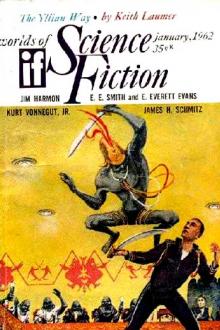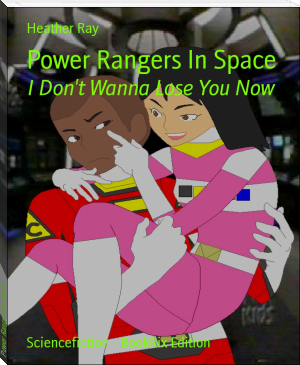Alien Pets - Trisha McNary (free e books to read online .TXT) 📗

- Author: Trisha McNary
- Performer: -
Book online «Alien Pets - Trisha McNary (free e books to read online .TXT) 📗». Author Trisha McNary
Antaska ignored the voice. She was stunned to hear her suspicions confirmed by M. Hoyvil.
“But most of the Verdantes on Earth who help our species are smaller than you and younger than you? I heard they’re between 400 and 600 years old. Are you saying that our planet has been overseen all this time by children?” Antaska asked.
“Physically, the Verdante supervisors on Earth may be children, but their mental capacity is beyond that of your oldest scientists,” M. Hoyvil answered. “They understand and provide your race with the technological and medical advances that have more than doubled your lifespans from what they were when we first made contact with you about 10,000 years ago.”
“I guess,” said Antaska. “But they’re still children really, right?”
“Here’s another comparison. Take the example of your own age of fifty,” M. Hoyvil said. “Physically, you’re are now a young adult. Before the Verdantes started helping Earth humans, a woman your age would have been in her late middle ages, soon on her way to old age. Just a few hundred years before that time, most Earth humans didn’t even live to be your age. And if the life expectancy of your species doubles again in the future, a woman your age will just be starting adolescence—at the same growth stage that I’m at. So if you were a member of a species with a lifespan that was twice what you have now, would you think of yourself as a child?”
Antaska thought about M. Hoyvil’s somewhat confusing explanation. In a weird way, it made sense. But on the other hand, it stirred up even more questions in her mind.
“I understand what you’re saying,” she said finally, “but I don’t understand why you would send children among us to act as our trainers and supervisors instead of sending adults. It seems like the adult Verdantes were hidden from us. Why?”
“There’s a very simple answer to that question,” said M. Hoyvil. “Our children are closer to your species in size than our adults and, therefore, less disturbing. Our sociologists studied the Earth humans for some time before the first contact. They determined that your people would be frightened by a much larger, alien-looking species. Actually, most humanoids are.”
Antaska turned and down looked at tiny Potat by her side. The little cat didn’t seem frightened at all. She was calmly washing first one paw and then the other.
“Anyway, as you probably learned when you studied your history in school, the humans of Earth were quite violent at the time of our first contact,” M. Hoyvil went on. “They frequently used deadly weapons if they felt threatened. Of course, our superior technology would have prevented them from harming us. But our goal was to establish a peaceful, harmonious relationship and to be seen as your benevolent helpers. It was decided that the quickest way to do that was to send those of us most similar in appearance to your race—our children—as our representatives.”
“Are you saying that your people left children alone on another planet unsupervised, trusting them to supervise the planet’s inhabitants?” Antaska asked.
She still wasn’t able to entirely grasp the logic of what M. Hoyvil was telling her.
“Oh no, they were never left alone,” he assured her. “Many full-grown adults as well as various adolescents have been living on Earth with the children from the beginning. But they never show themselves to the Earthlings. The adults stay inside the restricted area we set up on your planet, but they’re always there monitoring and directing things. Believe me, you can’t get away from them wherever you go.”
M. Hoyvil finished speaking with what sounded like resentment in his voice. Then he flopped backward and rested against the back of the couch.
After this long amount of use, M. Hoyvil’s vocal cords started to feel the strain. He paused, pulled out two drink tubes from the wall cabinet, and offered one to Antaska. M. Hoyvil took a big drink. He drank thirstily from his tube and watched Antaska drink from hers too. M. Hoyvil hoped it was a sign that she was getting tired of talking too. But he looked at her, waiting to see if she was going to ask him anything else.
I’ll keep talking if I have to, he told himself.
Antaska was silent for a moment. Now M. Hoyvil wondered if she was disturbed by what he had told her. He had been warned not to say too much, after all.
“Are you upset by what I told you?” he asked.
“No. It’s just very different than what I thought I knew about the Verdantes,” Antaska said, “but I guess it’s not a problem for me. I need some time to think about this. Then, I’ll probably have some more questions, if you don’t mind.”
“I don’t mind at all,” answered M. Hoyvil.
He was relieved that he wouldn’t have to keep talking.
“There’s just one thing I have of to ask of you,” he said. “Please don’t give this information to the other Earth humans. As I said earlier, we believe that the only time to answer such questions is when they’re asked. When the truth is right in front of someone’s face, and that person doesn’t see it, that’s a sign of not being ready for the truth. If you give people the answers before they’re ready to hear them, it can be very disturbing and lead to possible emotional problems. I’m sure you wouldn’t want that to happen.”
“I won’t say anything,” Antaska agreed to his request.
“You need to start seeing the truth soon,” M. Hoyvil heard a soft female telepathic voice say.
He looked down to see Potat sitting on Antaska’s legs and staring up into her eyes.
A deep chiming noise sounded, coming from no particular direction or device in the room.
“It’s time for my next class—astronomy,” said M. Hoyvil.
He felt relief at not having to continue the pretense of going to business meetings.
“Would you like to go with me, or would you rather stay here and rest? I know you’ve had a hard day already,” he said to Antaska.
“I like astronomy, and I’d really like to go, even though I am kind of tired,” she answered.
She took the news very well, thought M. Hoyvil with relief.
He stood up and walked with Antaska toward the door. He hadn’t admitted to himself how worried he’d been that she might experience some type of emotional or mental breakdown.
By showing herself to be resilient and adaptable, she has once again confirmed my superior abilities in choosing a good companion, he silently congratulated himself.
When they reached the door, M. Hoyvil heard a small “meow.” Potat had followed them and seemed intent on going along with them to class. M. Hoyvil looked down at her, forgetting his former feelings of resentment. It was difficult for him to stay mad at such a cute tiny creature.
“I’d like to take you along, but I don’t know if the instructor will allow non-humanoids in class.” M. Hoyvil chose his words carefully and spoke out loud for Antaska’s benefit. “I’ll ask the instructor if we can bring you next time,” he promised.
“I’d really like to take you,” Antaska said too.
But Potat turned without another look at either of them and walked on stiff legs back toward the door to Antaska’s room. She seemed to communicate displeasure by bristling her fur and switching her gray-ringed tail rapidly back and forth. Its cottony white tip pointed accusingly from side to side.
M. Hoyvil’s astronomy class was taught in the same room as his last class, which Antaska learned had been galactic politics. A similar amount of male and female Verdante students filled the room. But less Earth humans were present than had been in the last class.
Antaska wondered if they were exhausted from the hard workout too and resting in their rooms. Or had some been bored by the long presentation they could see but not understand? Antaska was tired too, but she was curious.
As soon as she entered the room, Antaska heard whispering voices. She remembered what M. Hoyvil told her about building a mental wall, and she tried it. She concentrated on blocking out the whispers by picturing a wall in her mind between her and the sounds. Suddenly, the whispers were gone. It worked!
The instructor of the astronomy class was a ten-foot-tall, green-skinned female with large light green eyes and shoulder-length light green hair. Her bright red ship suit emphasized her green coloring. And she was clearly younger than the political science teacher, with very few lines on her large, heart-shaped feminine face.
A holographic display of the galaxy appeared above the raised platform at the back and center of the room. Antaska sat up straight in her utilitarian chair and watched in fascination. The view zoomed out to show the Milky Way as a part of its local galactic group. Then it zoomed out even more to where it became too small to see as part of its local supercluster.
The instructor pointed her wand to a spot within the supercluster. Antaska wondered if she was showing them the space ship’s approximate location of the Milky Way. The hologram changed and displayed more astronomical features. Antaska thought she recognized some but not most of them. She felt a longing to understand what was being taught.
“Maybe I could understand some of this if I stopped trying to block it out,” she thought.
But as the idea grew more appealing, another part of her brain protested and quickly shut down this line of thinking. And with that, a dark cloud seemed to descend in Antaska’s mind. She found herself numbly watching a rotating 3-D view of what looked like black holes and ignoring the whispers for the time being.
Into her mental numbness, thoughts of Eegor returned. Antaska felt a compulsion to solve the riddle of his true intentions toward her and the solidity of his relationship with Tilde. Intriguing questions and possible answers circled endlessly through her mind, causing her to experience mingled feelings of guilt and pleasure.
When the holograph faded, and the teacher sat down, M. Hoyvil told Antaska he would be right back. He walked to the back of the class and stood at the end of the short line in front of the teacher’s large desk. The teacher and each of the students stared silently at each other for a few moments, then the students turned and walked away. Absorbed in her mental fantasy world, Antaska waited patiently as M. Hoyvil moved up in line to take his turn.
M. Hoyvil spoke to his teacher. “The lecture today was fascinating,” he said, beginning the telepathic conversation with a compliment. “In addition to my human companion here today,” he said with a snaky wave of his six-fingered hand toward Antaska, “I have another pet in my care. She’s actually the pet of my human, a small feline, and she’s very interested in astronomy. She expressed the desire to attend classes with us. Would you mind if I bring her to the next class?”
“Are you asking me if you can bring a non-humanoid animal into my class?” asked the instructor in amused disbelief.
“Well, yes. They’re actually sentient, you know. She’s very well behaved,” he said, stretching the truth a bit, “and she won’t be any trouble in the classroom.”
The enormous light green eyes of the big teacher crinkled up high and seemed to glow with bright amusement. She laughed loud but unheard





Comments (0)